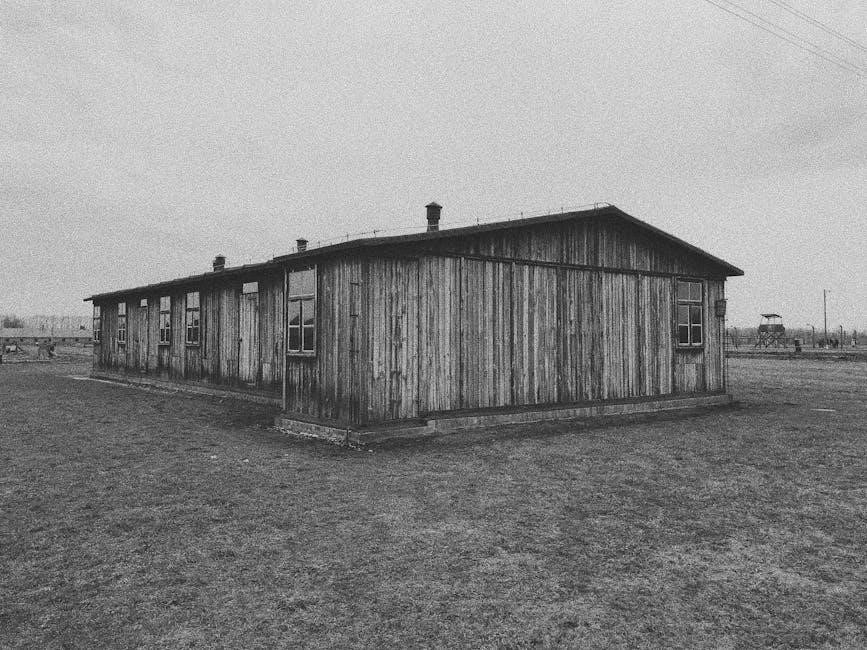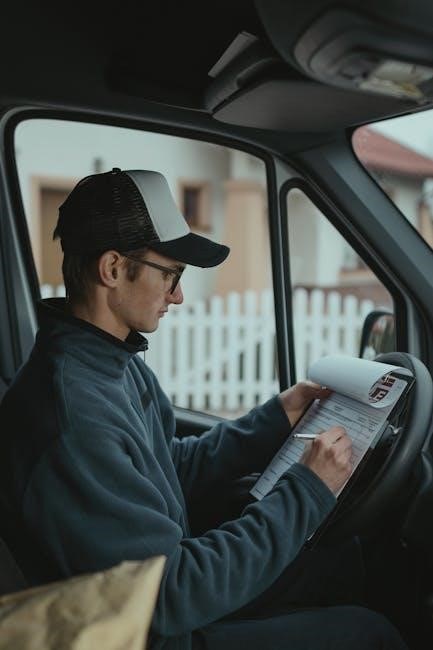The Holocaust, explored in Gail Herman’s book, was a systematic genocide of six million Jews by the Nazi regime during 1941-1945. It was a state-sponsored persecution on an unprecedented scale, impacting millions across Europe and beyond.
Definition and Historical Context
The Holocaust, as defined in Gail Herman’s book, was a systematic, state-sponsored persecution and murder of six million Jews and millions of others by the Nazi regime between 1933 and 1945. It was rooted in Nazi ideology, which sought to establish racial purity by eliminating Jews, Romani people, disabled individuals, and political dissidents. The Holocaust began with legal discrimination, such as the Nuremberg Laws of 1935, which stripped Jews of citizenship and rights. This escalated into forced segregation in ghettos and, ultimately, mass extermination in concentration camps during World War II. Herman’s work provides a clear, age-appropriate explanation of these events, emphasizing the historical context and the devastating consequences of hatred and prejudice.
Key Events and Timeline
Gail Herman’s book outlines the Holocaust’s key events, beginning with the rise of the Nazi regime in 1933. The Nuremberg Laws of 1935 stripped Jews of citizenship, marking the start of systematic persecution. By 1939, Nazi Germany invaded Poland, expanding territorial control and escalating anti-Semitic policies. Ghettos were established to confine Jews, leading to harsh living conditions and mass starvation. The “Final Solution,” launched in 1942, aimed to exterminate Jews through concentration camps like Auschwitz. Millions were murdered in gas chambers, with crematoria used to dispose of bodies. The Holocaust ended in 1945 as Allied forces liberated camps, revealing the horrors of the genocide. Herman’s work provides a clear timeline, emphasizing the progression from legal discrimination to mass murder, and highlights the unimaginable suffering endured during this dark period in history.
Impact on European Jewry
Gail Herman’s work vividly portrays the devastating impact of the Holocaust on European Jewry. The genocide led to the murder of six million Jews, erasing nearly two-thirds of the European Jewish population. Communities that had flourished for centuries were destroyed, with entire families, cultural institutions, and synagogues lost. The trauma extended beyond physical death, leaving survivors to grapple with psychological scars and the loss of their heritage. Herman’s book emphasizes how the Holocaust shattered the social and cultural fabric of Jewish life in Europe, creating a void that could never be filled. The aftermath saw many survivors displaced, struggling to rebuild their lives in new countries. The Holocaust remains a profound tragedy, deeply affecting the identity and continuity of European Jewry, as Herman’s narrative poignantly illustrates.
Gail Herman’s “What Was the Holocaust?”
Gail Herman’s book provides a clear, accessible introduction to the Holocaust, explaining its historical context and significance. It is designed for young readers, offering a sensitive yet comprehensive understanding of this tragic event.
Overview of the Book

Gail Herman’s “What Was the Holocaust?” is a concise and accessible book that explains the Holocaust in a way suitable for young readers. It provides a clear introduction to this tragic period in history, detailing the systematic persecution and murder of six million Jews and millions of others by the Nazi regime. The book is part of a series designed to educate children about significant historical events, offering a sensitive yet comprehensive overview. Herman’s approach ensures that complex themes are presented in an age-appropriate manner, making it an invaluable resource for understanding this critical chapter in human history. The book is available in PDF format, allowing easy access for readers worldwide. It serves as an essential starting point for those seeking to learn about the Holocaust and its profound impact on the world.

Target Audience and Approach
Gail Herman’s “What Was the Holocaust?” is primarily aimed at a younger audience, particularly middle-grade readers aged 8–12, though it is also accessible to older readers seeking a concise understanding. The book is designed to introduce children to this complex and sensitive topic in a way that is both educational and appropriate for their age. Herman’s approach is straightforward and clear, avoiding overly graphic details while still conveying the gravity of the events. The text is supported by photographs, illustrations, and a straightforward narrative, making it engaging for young learners. By focusing on key events and explaining concepts like antisemitism, the Nazi regime, and the impact on Jewish communities, the book provides a foundation for understanding the Holocaust. Its accessible language and structured format make it an effective tool for educators and parents seeking to teach children about this important historical period in an age-appropriate manner.
Reception and Reviews
Gail Herman’s “What Was the Holocaust?” has received widespread acclaim for its ability to present a sensitive and complex topic in an accessible manner. Reviewers praise the book for its clear and concise language, making it suitable for younger readers while still conveying the gravity of the Holocaust. Many educators and parents appreciate how the book balances historical accuracy with age-appropriate content, avoiding graphic details that might disturb children. The inclusion of photographs and illustrations is particularly noted for enhancing understanding and engagement. The book has been recommended as a valuable resource for introducing the Holocaust to middle-grade students, with some reviewers highlighting its role in sparking important conversations about prejudice and tolerance. Overall, the book is celebrated for its educational value and its thoughtful approach to a difficult subject, making it a trusted resource for both classrooms and home libraries.
The Holocaust: A Historical Overview
The Holocaust was a systematic persecution and extermination of six million Jews and millions of others by the Nazi regime during World War II, marking one of history’s darkest atrocities.
The Rise of the Nazi Regime
The rise of the Nazi regime in Germany began in the aftermath of World War I, fueled by economic instability and widespread resentment over the Treaty of Versailles. Adolf Hitler, a charismatic leader with a vision of racial purity, capitalized on these conditions to grow the National Socialist German Workers’ Party (NSDAP). By 1933, Hitler became Chancellor, marking the start of the Third Reich. The Nazis swiftly dismantled democratic institutions, consolidating power through propaganda, fear, and violence. Hitler’s ideology emphasized Aryan supremacy and blamed Jews for Germany’s problems, laying the groundwork for the Holocaust. The regime’s aggressive nationalism and militarism set the stage for World War II, while its racist policies targeted Jews, Roma, disabled individuals, and political dissidents. This period marked the beginning of one of history’s darkest chapters, as Nazi ambitions for racial purification and territorial expansion escalated into unprecedented atrocities.

The Nuremberg Laws and Persecution
In 1935, the Nazi regime enacted the Nuremberg Laws, a set of legal decrees that systematically stripped German Jews of their citizenship and rights. These laws, passed at the annual Nazi Party rally in Nuremberg, formalized racial discrimination and marked a turning point in the persecution of Jews. The laws prohibited marriage and sexual relations between Jews and non-Jews, categorizing Jews as a separate and inferior race. This legal framework justified escalating violence and marginalization, as Jews were excluded from public life, professions, and economic activities. The Nuremberg Laws also extended to other groups, such as Roma and individuals with disabilities, solidifying the Nazi regime’s vision of a racially “pure” society. These measures laid the groundwork for the Holocaust, transforming anti-Semitic ideology into state-sponsored persecution. Gail Herman’s book highlights how these laws were a critical step in the systematic dehumanization and isolation of Jewish people, leading to their eventual extermination.

The Final Solution and Concentration Camps
The Final Solution, implemented during World War II, was the Nazi plan to exterminate the Jewish population of Europe. This systematic genocide was formalized at the Wannsee Conference in 1942, where high-ranking officials outlined methods for mass murder. Concentration camps, initially used for detention and forced labor, were transformed into death camps equipped with gas chambers and crematoria. Millions of Jews were deported to camps like Auschwitz, Treblinka, and Sobibor, where they were subjected to brutal conditions and ultimately murdered. The camps symbolized the industrialization of genocide, with the Nazis exploiting efficient methods to carry out mass killings. Gail Herman’s book explains how the Final Solution represented the culmination of Nazi anti-Semitic policies, emphasizing the horrors of the concentration camps and the unimaginable suffering of victims. This section underscores the atrocities committed and serves as a stark reminder of the dangers of unchecked hatred and totalitarianism.
Liberation and Aftermath
The liberation of concentration camps by Allied forces in 1944–1945 exposed the full horrors of the Holocaust to the world. Soldiers found thousands of starving, sick, and traumatized survivors, along with massive graves and crematoria. The liberation marked the end of the Nazis’ systematic genocide but left survivors to grapple with unimaginable loss and trauma. Many survivors faced challenges in rebuilding their lives, with limited resources and support; The aftermath also saw efforts to hold perpetrators accountable through trials like those at Nuremberg, though many escaped justice. Gail Herman’s book highlights the resilience of survivors and the importance of remembering this dark chapter in history to prevent future atrocities. The liberation and its aftermath remain a poignant reminder of humanity’s capacity for both cruelty and compassion.

Key Themes in “What Was the Holocaust?”
Key themes include explaining the Holocaust to children, the role of education in understanding genocide, and preserving Holocaust memory through stories and historical context.
Explaining the Holocaust to Children
Gail Herman’s What Was the Holocaust? approaches the delicate task of explaining this tragic event to children with sensitivity and clarity. The book uses age-appropriate language to introduce young readers to the historical context, avoiding graphic details while conveying the gravity of the Holocaust. Herman emphasizes the human stories, highlighting the experiences of victims, survivors, and rescuers to create an emotional connection. She explains the rise of the Nazi regime and the systematic persecution of Jews and other groups in a way that fosters understanding without overwhelming her audience. The book also underscores the importance of empathy, tolerance, and standing against injustice, providing moral lessons that resonate with children. By simplifying complex historical events, Herman makes the Holocaust accessible to younger readers while preserving the truth and significance of this pivotal moment in history.
The Role of Education in Understanding Genocide
Education plays a crucial role in helping individuals understand the Holocaust and other genocides, fostering empathy and critical thinking. Gail Herman’s What Was the Holocaust? serves as an educational tool, introducing young readers to this dark chapter of history in an accessible way. By explaining the events leading to the Holocaust, the book highlights the dangers of prejudice, hatred, and unchecked power. It encourages readers to reflect on the consequences of discrimination and the importance of standing against injustice. Education about genocide empowers future generations to recognize early warning signs and advocate for human rights. Herman’s approach ensures that the Holocaust is not just a historical event but a lesson in humanity, promoting tolerance and understanding. This educational foundation is vital for preventing similar atrocities and fostering a more compassionate world.
Preserving Holocaust Memory
Preserving the memory of the Holocaust is essential to honor its victims and ensure that future generations learn from this tragic event. Gail Herman’s What Was the Holocaust? contributes to this effort by presenting the history in a way that is accessible to young readers. The book serves as a tool for remembrance, highlighting the importance of never forgetting the atrocities committed. By sharing the stories of survivors and the lessons learned, Herman’s work helps keep the memory of the Holocaust alive. Memorials, educational programs, and books like this one play a vital role in preserving history and preventing future genocides. Remembering the Holocaust ensures that its victims are not forgotten and that their stories continue to educate and inspire humanity. Preservation of memory is a collective responsibility, fostering a world that values peace, justice, and human dignity.

Additional Resources

Additional resources like PDFs, eBooks, and study guides complement Gail Herman’s book, offering deeper insights and supplementary materials for understanding the Holocaust. These tools enhance learning and provide further reading opportunities.

PDF Availability and Accessibility
Gail Herman’s “What Was the Holocaust?” is widely available in PDF format, making it accessible for readers worldwide. The book can be downloaded from various online platforms, including major eBook retailers and educational websites. Many libraries also offer free access to the PDF version through their digital collections. Additionally, some websites provide preview snippets or free chapters, allowing readers to explore the content before purchasing. The PDF format ensures compatibility with multiple devices, such as tablets, smartphones, and e-readers, making it easy to read on the go. For those with disabilities, accessible versions with readability features are often available. This widespread availability helps ensure that the important lessons of the Holocaust reach a broad audience, fostering education and understanding.
Related Books and Materials
Besides Gail Herman’s “What Was the Holocaust?”, there are numerous books and resources available for those seeking a deeper understanding of this historical event. For younger readers, works like “The Boy in the Striped Pajamas” by John Boyne and “Number the Stars” by Lois Lowry provide compelling narratives that explore the Holocaust through fictional accounts. For non-fiction, “Night” by Elie Wiesel offers a firsthand account of life in concentration camps. Additionally, educational materials such as documentaries like “Shoah” and study guides from reputable sources like the United States Holocaust Memorial Museum can enhance learning. These resources, many available in PDF formats, cater to various learning preferences and ages, ensuring a comprehensive exploration of this significant historical period.

Online Educational Tools
For those exploring the Holocaust, numerous online educational tools provide valuable insights and resources. Websites like the United States Holocaust Memorial Museum (USHMM) offer comprehensive lesson plans, interactive timelines, and survivor testimonies. Platforms such as Yad Vashem and the Shoah Foundation also provide access to historical archives, educational videos, and personal stories. Additionally, tools like the IWitness platform allow users to engage with survivor testimonies through guided activities. Many of these resources are available in downloadable formats, including PDFs, making them accessible for classroom use or personal study. These tools are designed to educate audiences of all ages, fostering a deeper understanding of the Holocaust’s history and its lasting impact. By utilizing these resources, learners can engage with the subject in an interactive and meaningful way.










